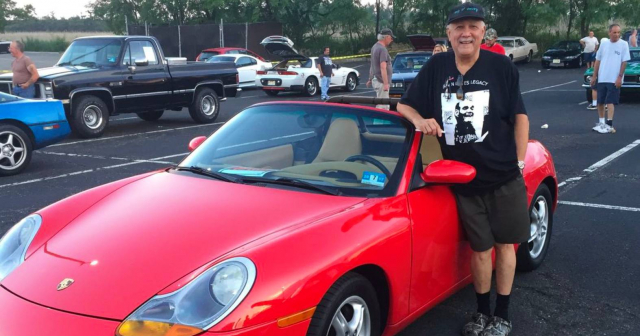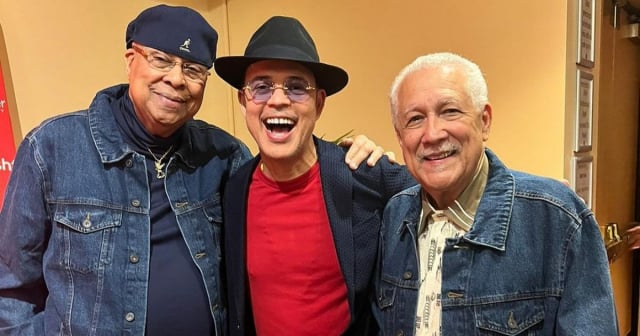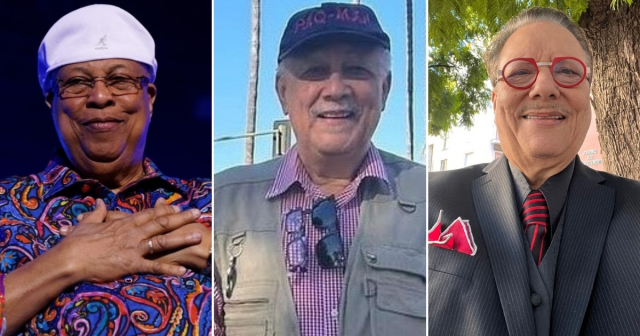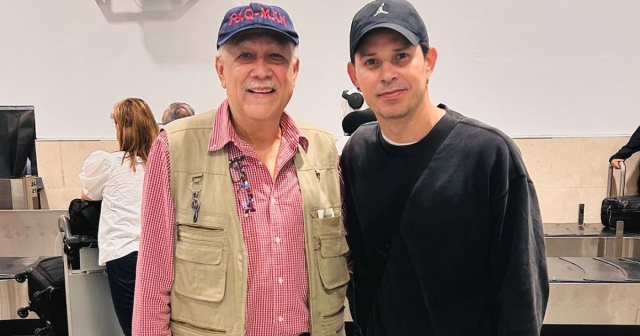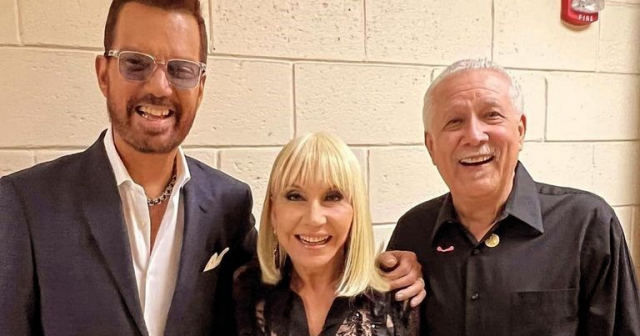The Cuban musician Paquito D' Rivera (Havana, 1948), a major figure in the world of jazz, has spoken with CiberCuba on the eve of embarking on a seven-week tour of Spain, Portugal, and Slovenia. Despite his suitcases not being packed yet, the master of the saxophone and clarinet dedicated half an hour of his scarce time to talk a little about Cuba because, despite his exile in New York, he still keeps an eye on everything happening on the island.
He also revealed details about the performance he has planned for July 11th at the Palau de la Música in Valencia (Spain), alongside the Valencia Orchestra, flamenco guitarist Juan Manuel Cañizares, harmonica player Antonio Serrano ("if God played the harmonica, he would play like him," says D'Rivera), and pianist and personal friend Pepe Rivero. With them, he will celebrate his 70 years on stage. And he doesn't hide that he does get tired, but he quickly clarifies that when that happens, he goes to bed, rests, and then is no longer tired. "I like this life of traveling and yes, I get tired, I get really tired, especially now that one is old."
Paquito D'Rivera is one of the most sought-after figures in jazz festivals in Spain, and perhaps because of this and the continuous trips he makes to that country, the Cuban musician does not rule out looking for a house in some part of the Spanish geography. That is a certainty. He only has to decide where it will be: in Barcelona, in Madrid, or in the South. This does not mean that he will leave New York. That is not even a consideration for him, but he enjoys himself a lot in Spain and wants to find something there.
During the interview with Paquito D'Rivera, the artist did not lack the thousand anecdotes that come to his mind. Among them, his conversation with the Chinese multi-instrumentalist Yo Yo Ma, when the latter confirmed to him that what he likes most in life is not playing the cello, which has made him famous, but "talking to people." "Yo Yo," D'Rivera says, "is a good listener, he is truly interested in what you have to say."
When asked if, after 70 years on stage, he feels nostalgic for Cuba, Paquito D'Rivera was firm: "No," he said before explaining himself through a very personal example. He recalled that his grandfather had been "a spectacular guy, very friendly, an incredible guy," a hero of the War of Independence, who left to fight at 14 in 95 or 96. "He died and I'm sure that if I go to my grandfather's grave now and open it, that's not my grandfather anymore. Cuba has become a tremendously sad thing."
And at this point, she remembered the deceased Cuban intellectual Carlos Alberto Montaner, who once said to her, "Kid, these people have caused so much trouble that they've even killed my nostalgia."
D'Rivera gives the example of his friend Dulce María, who called him a few days ago, a woman who has always been "a bell of joy" and mentioned that she told him she is going to take that trip she has wanted to take for a long time this year. Paquito D'Rivera replied, "Hey, you're finally going to be able to get out of that hell. Where are you going?" and she replied that the trip she was talking about is suicide.
The artist laments that the Cuba he left behind no longer exists. "Not even the way of speaking or the names of Cubans are the same." And he assures that he never says "asere", a word he remembers hearing from the kids who went to his school and came from Pogolotti, a working-class neighborhood. "Only the boys who came from those marginal neighborhoods were the only ones who said asere."
He also criticized that the people currently leaving the Island are doing so because "eggs are too expensive." "The people who were leaving in the sixties and seventies complained about the lack of freedom, about not being able to speak. The concept of freedom was very special for Cubans back then. Now they leave because the bus doesn't come. They are material problems. Spirituality has left that country." The only thing that remains, clarifies, is music. "It is one of the few things they have not been able to kill. Cubans have always been very artistic."
About Chucho Valdés, Paquito D'Rivera acknowledged that he was the most important person in his career. "I learned so much from Chucho. I remember the first time I saw Chucho. They used to have 'jam sessions' at a place called La Habana 1900, which was next to Telemundo, on Channel 2. It was a basement. They did it at noon, at 12 o'clock noon. A pianist named Samuel Téllez came, a very friendly guy. He was a man who had eyes like a toad, bulging out, and I would tell him and he would say no, that his face was very far back."
That day, at the back of the venue, Paquito D' Rivera saw a very tall black young man playing the piano in the style of Oscar Peterson. "That cannot be done, and even less by a young man who, if I was 14, was 19. The impact was huge, and I was left speechless. Téllez noticed it and said to me, 'That's Bebo Valdés' son.' I didn't even dare to approach him. Later, we met at the Teatro Musical of Havana two or three years later. I joined the theater as a saxophonist. My father didn't want me to. He wanted me to finish my studies. The rest is history. Everywhere we worked, we worked together."
At this point, he also mentioned a conversation he had with Chucho Valdés when he warned him that the Cuban regime is using him. "I'm not saying that he is replacing Alicia Alonso, but the other day I called him 'upset'. The Press Sewer Agency (referring to Prensa Latina) announces Chucho Valdés's upcoming tour of Europe and they put a photo we took in Miami, where Chucho is in the middle, Arturo Sandoval here, and me there. Is that a mockery or what is it? When he told me he wasn't going back to Cuba, then I decided that I could work with Chucho again."
I am very grateful to Chucho for calling me to join Irakere when I was at home doing nothing. They kept me locked up in my house for two years doing nothing. And they were paying me and everything. Look at how generous the revolution is. I told Chucho, it's great that you are not going back to your country anymore, but remember, they won't let you go so easily. And proof of that is that Prensa Latina has announced Chucho's European tour and congratulated him on his birthday. "They never said Happy Birthday to Celia Cruz".
Regarding Díaz-Canel, whom Paquito D'Rivera considers a man with "lack of charisma and a straight face," he emphasized that he is still surprised that there are people who applaud him in the churches of New York after mistreating the religious community so much. "They could never mistreat me because I was never religious."
Asked about reggaeton and the urban music movement, Paquito D'Rivera avoided criticizing them. "Throughout life, there have always been people with talent and people without talent. There have also been people without talent who have been successful. That is inevitable. Everyone does what they can, or what they want. It is a very musical island, there is no doubt about that. That is one of the few things they have not been able to kill there, art."
About the neighborhood, he insisted: "What is the neighborhood? I cannot speak about something I do not know?"
When asked what he still has to do with such a fulfilling life, D'Rivera replied: "I like my job. If I had to do it over, I would do it again. One thing I have yet to do is perform in my country. I think that someday that should happen. I wouldn't want to be left dressed up for the party like Celia (Cruz), but as long as they are there, I am not going for many reasons. I am afraid. That people are not reliable. You know they can do whatever they want to you and not pay you."
Paquito D'Rivera also remembered the political prisoners in Cuba. "It's shameful that Maikel Osorbo is in prison for singing. Ten years in jail for shouting 'Freedom', for shouting 'Food'. It's very difficult to come back to a place like this."
Regarding the measures of the Biden Administration benefiting small and medium-sized enterprises, the musician stated: "They are feeding the piranhas." Additionally, he criticized the parole, as he believes that "one day we will have Ramiro Valdés here (in the United States) if a nephew claims him." "When the ship starts sinking, the rats jump."
"Politics makes strange bedfellows," Paquito D'Rivera quoted to recall a phrase that his grandmother used to dedicate to politicians. "They are the ones responsible."
D'Rivera also commented on how long the end of the regime is taking. "It's like the endings of Beethoven's symphonies, they never end."
What do you think?
COMMENTFiled under:

